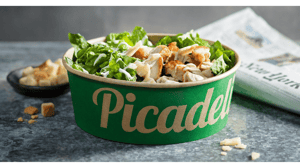RETHINKING RDAS
ATLANTIC CITY, N.J. -- A panel of retailers and publishing executives, assembled here earlier this month during the Periodical & Book Association of America's annual convention, was asked to rethink retail display allowances, which have become inherent in retailing single-copy magazines.RDA payments, which began in the 1950s, according to publishing consultant and panel moderator Michael Kessler,
June 28, 1999
JOEL ELSON
ATLANTIC CITY, N.J. -- A panel of retailers and publishing executives, assembled here earlier this month during the Periodical & Book Association of America's annual convention, was asked to rethink retail display allowances, which have become inherent in retailing single-copy magazines.
RDA payments, which began in the 1950s, according to publishing consultant and panel moderator Michael Kessler, chief executive officer of Central Sales & Marketing, Fair Lawn, N.J., are viewed as an incentive to reward retailers for displaying magazines. Generally, payments are made directly to retailers based on 10% of the cover price of each copy sold, he said.
Since their inception,"RDAs were always perceived by retailers as an incentive that was not meant to be paid," Kessler stated. He said the situation improved in the 1970s, "when RDA consultants helped retailers collect these once illusive payments." At that point in time, he added, retailers began to allocate more selling space to magazines, "as the collection of these allowances provided the incentive to build the category."
But as these allowances have evolved, the process of payment has become weighted down in complexity that puts an extra burden on retailers. Some publishers "require complex math calculations," pointed out Jerry Lynch, business group manager for general merchandise at Wegmans Food Markets, Rochester, N.Y. The chain's goal is to simplify incentive programs and payments so they don't add "a level of complexity that distracts us from sales," Lynch said. He'd like an incentive program that's "as simple as possible to manage, and easy enough for category managers to understand and calculate."
George Boyer, national category manager for publications at Southland Corp., Dallas, called for the elimination of RDAs, which the company would never consider in the past. "The special accounting that different publishers require is a nightmare, and it's something we look to eliminate. Our retailers spend too much time worrying about tracking RDA payments," which he said detracts from their best performance.
The retailer panelists generally agreed they would accept a magazine program without RDAs, as long as there was an off-invoice discount, or some other form of compensation in the package. Publisher incentives that run higher than normal but require retailer performance and submission of sales data in order to collect the allowances are often too cumbersome and complex to administer, they said.
Wegmans no longer views the lack of an RDA as a negative. "You need to look at the bottom line and the total profits," said Lynch. Wegmans "wants to drive sales and get off looking at the RDA." Moreover, he said, the goal of any new incentive program should be to drive cost out of the system for all parties -- the retailer, the wholesaler and publisher.
"Eliminating RDAs would be OK if at the end of the day you had the same gross profit," said Dennis Burns, category manager for books and magazines at Eckerd Drug, Clearwater, Fla. He also wants to simplify the whole procedure. "Whatever system is used, must have the complexity taken out," he commented.
Publishers' reps, who could help facilitate these programs, call on retailers infrequently, the panelists said. "I don't want to shock anyone but there's not a flood of publishers' reps coming in to see me, and given our number of outlets I find this shocking," said the Southland category manager. In the case of Wegmans, Lynch said, he sees publishers' reps "very infrequently," adding that publishers also could make better use of supermarkets' category managers.
Panelist Marcia Orovitz, vice president of retail sales for Times Mirror Magazines, New York, said she was convinced retailers would still welcome visits from publishers' reps regardless of the form of incentive program, and even if a publisher doesn't offer RDAs.
A retailer unfurling the welcome mat for a publisher "depends on several factors, including the popularity of the product, what kind of sales volume it can do, the cover price as well as allowances," she said.
Retailers said they welcome help from publishers to drive magazine sales. This could be in the form of expertise in cross promoting with other products to developing programs that work well in other sections of the store.
At Wegmans, for example, a special Conde Nast display of Gourmet magazine and other titles is cross merchandised on special racks. This has boosted the exposure of magazines, Lynch said.
The publisher targeted the magazine mix with selections that would appeal to Wegmans' customers who look for fresh and prepared foods. "It's this kind of program that we're anxious to try to drive sales," the retailer said.
About the Author
You May Also Like




